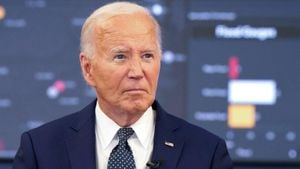China is observing the United States with careful eyes following the recent elections, particularly with Donald Trump returning to the presidency. This upcoming shift may have deep-rooted impacts on Sino-American relations, which have been increasingly tense during recent years. On November 18, 2024, the Chinese foreign ministry spokesperson Mao Ning expressed the country’s commitment to engaging following the elections based on "mutual respect, peaceful coexistence, and win-win cooperation." Yet, previous actions and policies have made Beijing apprehensive about future interactions with Washington.
During Trump's first term, U.S.-China relations reached their lowest points, with his administration initiating trade wars and frequently calling out China for unfair trade practices and intellectual property theft. The National Security Strategy also characterized China as a revisionist power aiming at long-term strategic competition with the U.S. With various multilateral alliances established under both Trump and Biden administrations, such as AUKUS and the Quad, China's perception remains one of being encircled militarily, squeezed diplomatically, and stifled technologically. According to Sourabh Gupta, a senior fellow at the Institute for China-America Studies, there are minimal expectations for improved relations under any administration.
After the election results on November 5, some analysts' views emerged, with Gupta mentioning Trump’s potential victory might not make China optimistic about easing conflicts. Others, such as Derek Grossman from RAND, suggested it may be easier for China under Trump, positing there could be grand strategic bargains to be made. For many observers, this uncertainty poses challenges for the future of U.S. foreign policy toward China.
The fallout of Trump’s unpredictable nature and his transactional view of alliances was highlighted during his first term, with potential impacts on alliances with countries like Japan, South Korea, and even the Philippines. Nishank Motwani from the Australian Strategic Policy Institute has noted the unpredictability might embolden countries like China, Russia, Iran, and North Korea to act more aggressively against perceived adversaries.
Much of the discussion surrounding Trump’s foreign policy includes concerns about Taiwan. Biden's administration has projected strong military support for Taiwan, underlining its importance as part of U.S. strategic interests against China. Trump, on the other hand, has made past statements indicating Taiwan is not part of American core interests and advocates for Taiwan to significantly bolster its own defense. Leah A. Newland, Associate Professor of Government at Smith College, cautioned about the long-standing U.S. dual deterrence strategy which could flounder if Washington appears hesitant to back Taiwan against aggressions.
On the ground, Taiwan’s response appears optimistic; the government expressed hope for continued cooperation with U.S. forces. President Lai Ching-te reassured on social media, mentioning, “The longstanding Taiwan-US partnership, built on shared values and interests, will continue to serve as a cornerstone for regional stability.” Meanwhile, comments from Xi Jinping’s allies support China’s stance over Taiwan, which poses complications amid rising tensions.
While Trump promises high tariffs on Chinese goods and support for Taiwan, his administration may lean toward negotiating compromises. His rhetoric during the campaign indicated fluctuated perspectives on Taiwan and trade. Some military analysts believe potential conflict could arise if U.S. support appeared unreliable to Taiwan.
The dynamics of U.S.-China relations may also reverberate outside the Asia-Pacific region, especially concerning traditional U.S. allies. After his victory, Trump could take harsher stances as evidenced by his previous administration's choices; key appointments included aggressive hawks who criticize China. For example, Mike Waltz has been positioned as national security adviser, and figures like Marco Rubio are likely to take pivotal roles promoting aggressive posturing against Beijing.
China’s leadership is also preparing for this new chapter, demonstrating strategic flexibility. According to Victor Shih, Director of the 21st Century China Center, Trump's administration reflects deep financial ties with American entrepreneurs who have significant interests within China, potentially moderates the harsher rhetoric. These dynamics appear complicated as Trump has occasionally oscillated between extremes of engagement and isolation.
Shih warns, nonetheless, of the unintended consequences of overly aggressive American policies which have resulted, paradoxically, with enhanced resilience among Chinese firms like Huawei, previously impacted by sanctions.
The reckoning from Trump's approach could lead to global shifts where newly perceived threats and solidarity among nations manifest changes internationally. Only time will reveal how China's strategy adapts to the changing narrative driven by American foreign policy decisions. Notably, Chinese academics forecasted potential increases in negative sentiments, with more divisive politics arising from the rise of new McCarthyism-style approaches potentially blending globally with economic and security diplomacy.
Regarding broader geopolitics, observers also noted how Trump’s second administration might interplay with India’s strategic decisions concerning defense against regional threats. Comments from Indian analysts indicated Trump may more readily accept India's balancing act vis-à-vis Russia and China. Notably, India might face pressures from both sides of its geopolitical spectrum as it tries to assert its autonomy.
Trump, previously less concerned about India's ties with Russia compared to the Democrats, might encourage India’s defense relationships globally. Discussions have already pointed to rising defense cooperation as India continues to assert itself regionally. For some, this may present renewed opportunities or complications, depending on how flat relations evolve.
The U.S. presence and its relations with regional allies will significantly shape the outcome of how these dynamics are negotiated moving forward. Understanding these intricacies amid fluctuated dialogues and tacit agreements remains key. If Trump leans on established pathways and engages allies pragmatically, there could be opportunity for cooperative efforts across the board, yet this may also entail certain risks.
With China already risqué maneuvers and stances, only time will tell whether Trump's second term will amplify tensions or navigate toward strategies fostering constructive engagement. The future lies not just with U.S. leadership but also with international counterparts and the responses adopted therein. There is hope for pathways built instead of walls, reflecting the potential for new avenues of discussion and cooperation, though rarely straightforward.



